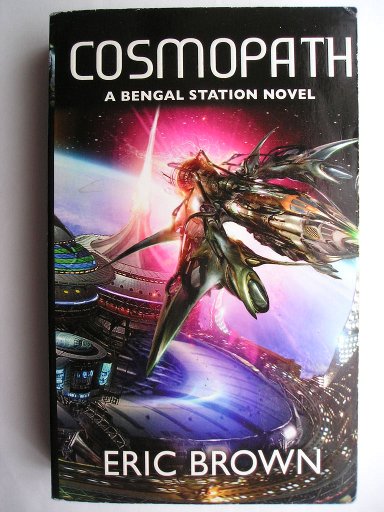
The novel “Cosmopath” by Eric Brown was published for the first time in 2010. It’s the third book in the Bengal Station trilogy and is the sequel to “Xenopath“.
Jeff Vaughan and Sukara’s daughter showed some health problem so she requires a medical examination. The diagnosis is bad because the child has a form of leukemia. The news comes at a difficult time for Jeff since recently some of the best Bengal Station’s telepaths were killed and he becomes the target of an assassination attempt.
Jeff is contacted by billionaire Rabindranath Chandrasakar, who offers a seemingly simple mission, which consists in reading the mind of a member of the crew of a spaceship on an exploratory mission. Jeff wouldn’t want to do it because the person is dead, kept in a state of stasis, but Chandrasakar offers him a high pay that includes the best care for his daughter. The journey on the planet Delta Cephei VII has dangers and surprises in store.
“Necropath” and “Xenopath”, the two previous novels in the Bengal Station trilogy, had almost opposite tones: the former had strong noir tones, the second contained a lot more optimism despite dramatic moments. Maybe Eric Brown he thought he had exaggerated with the cheerfulness and “Cosmopath” has a dramatic beginning, with the protagonist Jeff Vaughan victim of an assassination attempt and the diagnosis of leukemia for his daughter Li.
These problems affect Jeff and his wife Sukara after a few years of happiness. At the end of “Xenopath”, the couple had adopted Pham and shortly after had Li, their biological daughter. To pay for Li’s treatment, Jeff is forced to agree to read the mind of a person who died during an exploration mission to find out what really happened to her crew on the planet Delta Cephei VII.
In the previous two novels in the trilogy, several aliens appeared and Jeff traveled to other planets. In “Cosmopath” the structure of the story is a bit different, in the sense that the interstellar journey is a more important part of the novel. For this reason, it’s partially divided into two subplots of which one follows Jeff and the other Sukara and her daughters.
“Cosmopath” tells a story independent from the previous ones but the whole trilogy is strongly character-oriented, specifically Jeff and Sukara. Therefore, it’s necessary to read all the novels to fully appreciate their development and the many changes that occur in their lives.
The two previous novels were basically science fiction detective stories, in “Cosmopath” the science fiction elements are more important. Jeff’s journey on the planet Delta Cephei hasn’t only the purpose to obtain information to solve a case on Bengal Station but to find out what happened to the crew of an exploration starship.
Since this is a character-oriented story, it’s hardly surprising that Eric Brown also develops some of the ones introduced in “Cosmopath”, particularly the billionaire Rabindranath Chandrasakar and his collaborator / lover Parveen Das. The mystery connected to the planet Delta Cephei VII is one of the bases of the novel but throughout the story the relationships between the various characters are also important.
In “Cosmopath” Dr. Rao appears again, a recurring character in the trilogy. He’s a man with a very peculiar sense of ethics and morals who always seems to know everything that happens on Bengal Station. He’s often involved in events not necessarily legal and his path sometimes crosses Jeff and Sukara’s.
The story is developed with a generally high pace and several twists. In my opinion, “Cosmopath” is in some ways better than the previous novels because the mystery of the planet Delta Cephei VII allows Eric Brown to offer more surprises. “Xenopath” in particular seemed rather predictable but this time the events have developments that bring even more profound and unpredictable consequences on Jeff’s life.
The ending of “Cosmopath” concludes the Bengal Station trilogy in a way that leaves open the possibility of new stories that could be very different from the previous ones if Eric Brown ever decides to return to this series. In my opinion, this novel is in various ways the best of a trilogy that may be interesting especially for those who appreciate character-oriented stories.

